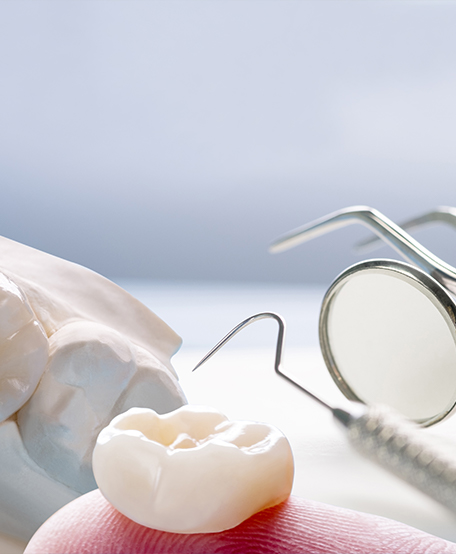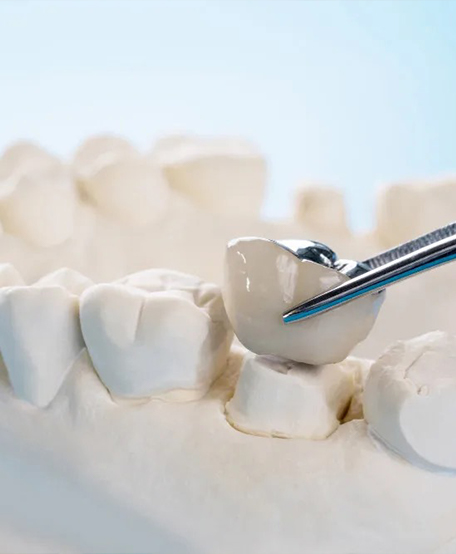Extractions
Extractions
At Fletcher Dental Care, our priority is to help you maintain a healthy, functional smile. However, in some cases, removing a tooth may be necessary to protect your overall dental health. Tooth extractions are a common dental procedure that may be required for various reasons, including damage, decay, or overcrowding. Our team is dedicated to making the extraction process as comfortable and stress-free as possible, providing you with compassionate care every step of the way.
The Procedure for Getting a Crown
Tooth extraction is a last resort, considered only when a tooth cannot be preserved with other treatments. Common reasons for extraction include:
- Severe Decay or Damage: When a tooth is extensively decayed or damaged beyond repair, an extraction may be necessary to prevent infection and alleviate pain.
- Impacted Wisdom Teeth: Wisdom teeth often become impacted or fail to emerge properly, leading to pain, infection, and alignment issues. Removing impacted wisdom teeth helps prevent complications.
- Overcrowding: For some orthodontic treatments, extraction may be required to create space in the mouth for teeth to align correctly.
- Periodontal Disease: Severe gum disease can loosen teeth, sometimes requiring extraction to protect surrounding teeth and tissue.
- Infection: If an infection extends to the tooth pulp and cannot be controlled with antibiotics or a root canal, extraction may be necessary to prevent the infection from spreading.

Types of Crowns
We offer two main types of extractions, depending on the condition of the tooth and its position:

Simple Extraction
Simple extractions are performed on teeth that are fully visible in the mouth. After numbing the area, our dentist uses specialised tools to gently loosen and remove the tooth. This procedure is quick and straightforward, requiring minimal recovery time.

Surgical Extraction
Surgical extractions are more complex, typically required for impacted teeth (such as wisdom teeth) or teeth that have broken off at the gum line. This procedure involves making an incision in the gum to access the tooth. Surgical extractions may take longer and require a slightly longer recovery period, but our team will ensure you’re comfortable and informed throughout.
What to Expect During a Tooth Extraction
At Fletcher Dental Care, we prioritise your comfort and care during every step of the extraction process. Here’s what you can expect:
- Consultation and Evaluation
Before proceeding with an extraction, we’ll conduct a thorough evaluation to understand your needs and determine the best approach. This includes examining X-rays to assess the tooth’s position and discussing any medical conditions that might affect the procedure. - Numbing and Anaesthesia
To ensure a pain-free experience, we’ll administer a local anaesthetic to numb the area around the tooth. For patients who feel anxious about the procedure, we offer additional sedation options to help you relax and feel comfortable. - Extraction Procedure
Once you’re fully numb, our dentist will perform the extraction. For a simple extraction, this involves gently loosening the tooth and removing it. For a surgical extraction, we may make a small incision in the gum and carefully remove the tooth, sometimes in sections to minimise impact on surrounding tissues. - Aftercare Instructions
After the extraction, we’ll provide you with detailed aftercare instructions to ensure a smooth recovery. These instructions will include information on managing discomfort, preventing infection, and caring for the extraction site to promote healing.
Aftercare for Tooth Extractions
Proper aftercare is essential for a quick, complication-free recovery. Here are some general aftercare tips:
- Manage Discomfort: Mild pain and swelling are normal after an extraction. Over-the-counter pain relievers and ice packs can help reduce discomfort. Follow our guidelines on what to take and avoid.
- Limit Physical Activity: Rest and avoid strenuous activities for at least 24 hours to allow the extraction site to begin healing.
- Avoid Rinsing or Spitting Forcefully: For the first 24 hours, avoid rinsing or spitting forcefully, as this could dislodge the blood clot and lead to dry socket.
- Eat Soft Foods: Stick to soft foods like yogurt, applesauce, and soup for the first few days, and avoid hot, crunchy, or sticky foods that could irritate the extraction site.
- Maintain Oral Hygiene Carefully: Gently brush your teeth, avoiding the extraction site, and avoid using mouthwash for the first 24 hours. After 24 hours, you may rinse with a warm saltwater solution to help keep the area clean.
Healing and Follow-Up
In most cases, the initial healing period after an extraction lasts about one to two weeks. During this time, new bone and gum tissue will gradually fill in the space left by the removed tooth. We recommend a follow-up appointment to monitor healing, especially if stitches were required. If a tooth was removed to prepare for a dental implant, bridge, or other restoration, we’ll discuss the next steps to restore your smile.
Fletcher Dental Care’s Commitment to Patient Comfort
At Fletcher Dental Care, we know that tooth extractions can be an anxiety-inducing procedure for some patients. Our team is committed to ensuring your comfort and addressing any concerns you may have. We offer sedation options, compassionate care, and clear communication to make the experience as smooth as possible. Your health and satisfaction are our top priorities, and we’re here to support you through every step of your treatment and recovery.

Frequently Asked Questions (FAQs)
How long does it take to recover from a tooth extraction?
Recovery time varies depending on the type of extraction, but most patients feel significantly better after a few days. Complete healing usually takes one to two weeks.
Is tooth extraction painful?
The extraction itself should not be painful due to the numbing anaesthesia provided. You may experience some discomfort and swelling after the procedure, which can be managed with prescribed pain relief and aftercare instructions
What is dry socket, and how can I avoid it?
Dry socket occurs when the blood clot at the extraction site becomes dislodged, exposing the bone and nerves. To prevent it, avoid drinking through a straw, smoking, and vigorous rinsing or spitting for the first 24 hours after your extraction.
Can I eat normally after a tooth extraction?
It’s best to start with soft foods like soup, yogurt, and applesauce for the first few days. Gradually reintroduce other foods as the extraction site heals, but avoid hard, crunchy, or sticky foods until you’re fully recovered.
What happens if I don’t get a problematic tooth extracted?
Leaving a severely decayed or damaged tooth untreated can lead to pain, infection, and potential damage to surrounding teeth. Extraction may be necessary to protect your overall dental health and prevent further complications.
Will I need a replacement for the extracted tooth?
In many cases, replacing an extracted tooth is recommended to maintain proper bite alignment and prevent shifting of adjacent teeth. We’ll discuss options like implants, bridges, or partial dentures to restore your smile and function.
Book Your Appointment Today!
Let our caring team make your next visit effortless, and feel free to reach out with any questions or concerns—we’re here to support you every step of the way.
